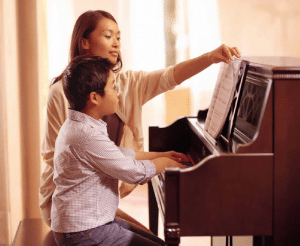Are you considering piano lessons in Madison? Your child’s first experience with music will likely be the most lasting. While referral services and suggestions from friends can point you toward people who teach, you will need to dig a little deeper to find the right piano teacher for your child. Just as you set high expectations for your children, you should set high expectations for their piano teachers. Interview at least two or three piano teachers to find one who demonstrates a commitment to teaching, is well organized and has a good piano.
Start your search for piano lessons at Madison Piano Place, LLC. We have piano teachers who are experienced and friendly, and are dedicated to helping children learn how to play the piano.
You know your child better than anyone. If they have any special needs, ask potential piano teachers in Madison if they have worked with other students with similar needs. Ask the piano teacher to describe the specific traits their best students have, then decide if they are a match for your child.
Asking these Seven Key Questions will help you quickly gain insight into each teacher’s strengths, weaknesses and style.
- Why did you decide to become a piano teacher?
- How do you go about setting goals and measuring progress?
- Tell me about your most challenging student.
- How do you communicate with parents?
- What can you tell me about your student recitals?
- How old are the pianos in your studio?
- How often do you have your pianos tuned?
Remember, the goal is not to get ‘right’ or ‘wrong’ answers, but to quickly learn enough about each piano teacher to find the best fit for your child and get the best piano lessons in Madison.

The Parent’s Simple Guide to Starting Children in Music



A Good Piano
The abilities of the piano that your child will practice on vary depending on how well it was built, how old it is and how it is maintained. The best piano will be one that your child will grow “into” instead of “out of”.

The easiest and most cost-effective way to find a good piano is to visit your local piano dealer and work directly with the owner if possible. They will want to spend about ten minutes talking with you to get a good idea of your needs. With the help of this expert, you should be able to find a great piano for lessons in your price range in an hour or so.
A new, well-built piano – whether acoustic or digital – is always the best option for any student. Nearly 100% of students who start out with a good piano continue to take piano lessons into high school.
Some used pianos can be appropriate for beginning students, but great care should be taken to make sure the piano still has enough life left to inspire your student. In addition to the condition, all student pianos should have the five keys of piano construction.
Parents build the environment for practice, teachers provide the instruction and the piano rewards the player. By building a solid foundation, you can make your child’s musical journey a fun, rewarding and lifelong experience.

